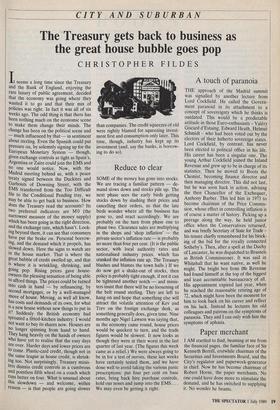CITY AND SUBURBAN
The Treasury gets back to business as the great house bubble goes pop
CHRISTOPHER FILDES
It seems a long time since the Treasury and the Bank of England, enjoying the rare luxury of public agreement, decided that the economy was going where they wanted it to go and that their mix of policies was right. In fact it was all of six weeks ago. The odd thing is that there has been nothing much on the economic scene to make them change their minds. The change has been on the political scene and — much influenced by that — in sentiment about sterling. Even the Spanish could put pressure on, by solemnly signing up for the European Monetary System — though, given exchange controls as tight as Spain's, Argentina or Zaire could join the EMS and no one would notice. Now, with the Madrid meeting behind us, with a peace treaty signed between the Duckites and Garboists of Downing Street, with the EMS transferred from the Too Difficult file to the Conditional Pending tray, we may be able to get back to business. How does the Treasury read the accounts? Its two preferred indicators are M 0 (the narrowest measure of the money supply) which has been going in the right direction, and the exchange rate, which hasn't. Look- ing beyond them, it can see that consumers have put the brake on. Personal borrow- ing, and the demand which it propels, has slowed down. Here the signs to watch are in the house market. That is where the great bubble of credit swelled up, and that is where it is wrinkling, shrinking, and going pop. Rising prices gave house- owners the pleasing sensation of being able to afford things. The prices could be turned into cash in hand — by refinancing, by second mortgages, or by a well-managed move of house. Moving, as well all know, has costs and demands of its own, for what is a new house without new things to put in it? Suddenly the British economy had sprouted a fitted-kitchen industry: I would not want to buy its shares now. Houses are no longer spinning from hand to hand. They hang heavily on the hands of owners who have yet to realise that the easy days are over. Harder days and lower prices are to come. Plastic-card credit, though not in the same league as house credit, is shrink- ing too. Not surprisingly, Treasury minis- ters dismiss credit controls as a cumbrous and pointless fifth wheel on a coach which runs better on four. What is unusual about this slowdown — and welcome, within reason — is that people are going slower
than companies. The credit squeezes of old were rightly blamed for squeezing invest- ment first and consumption only later. This time, though, industry has kept up its investment (and, say the banks, is borrow- ing to do so).










































 Previous page
Previous page